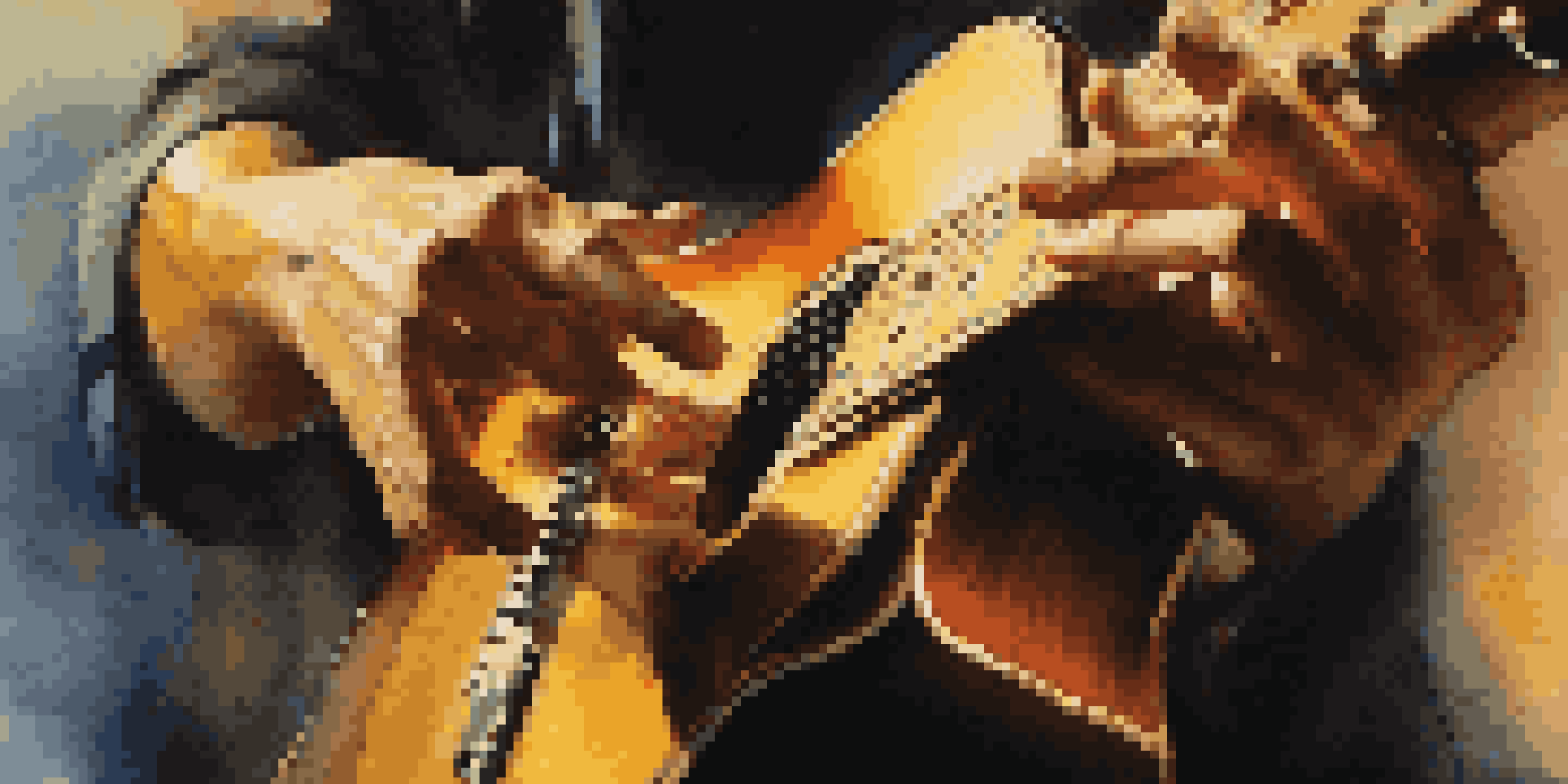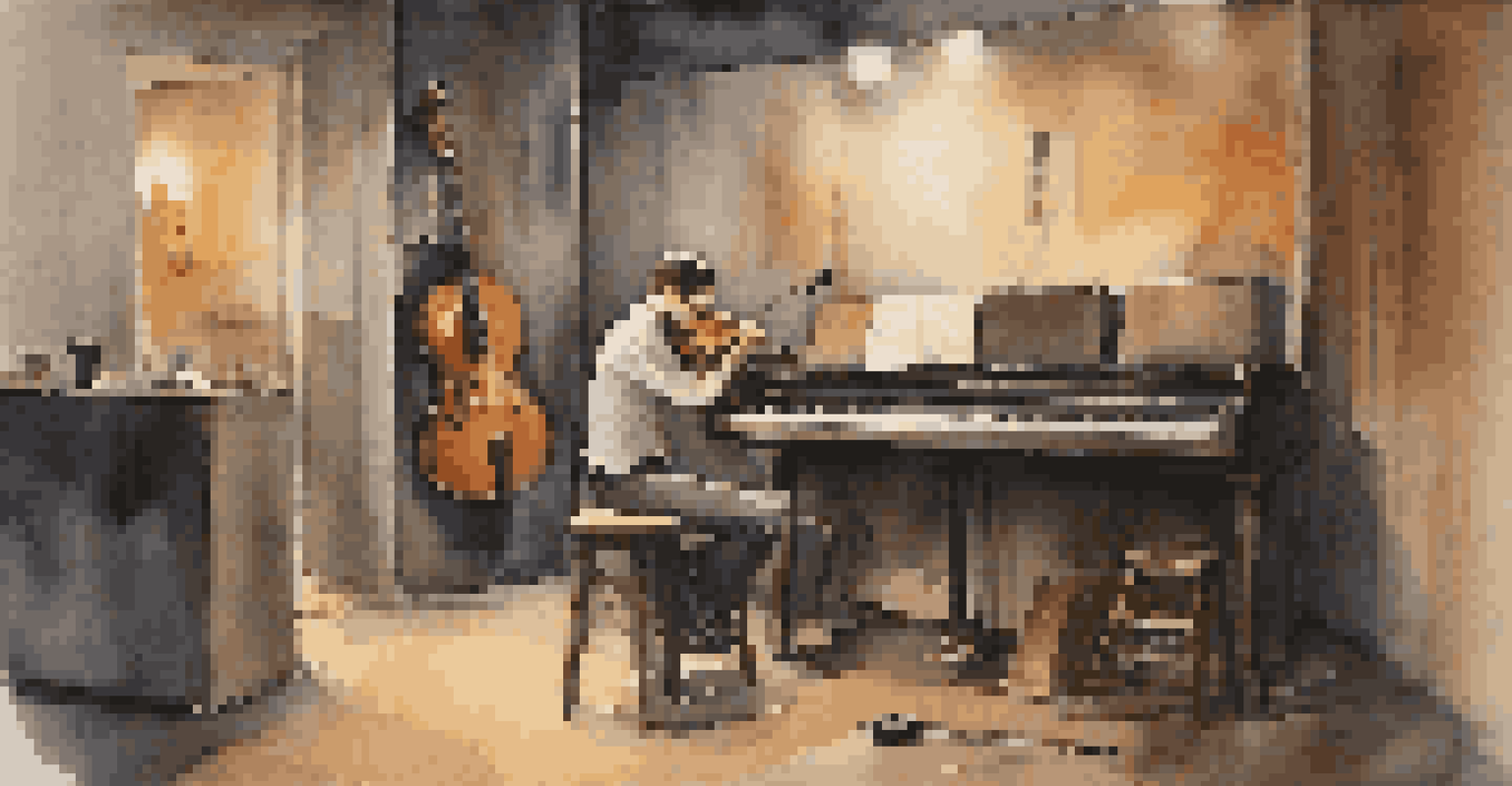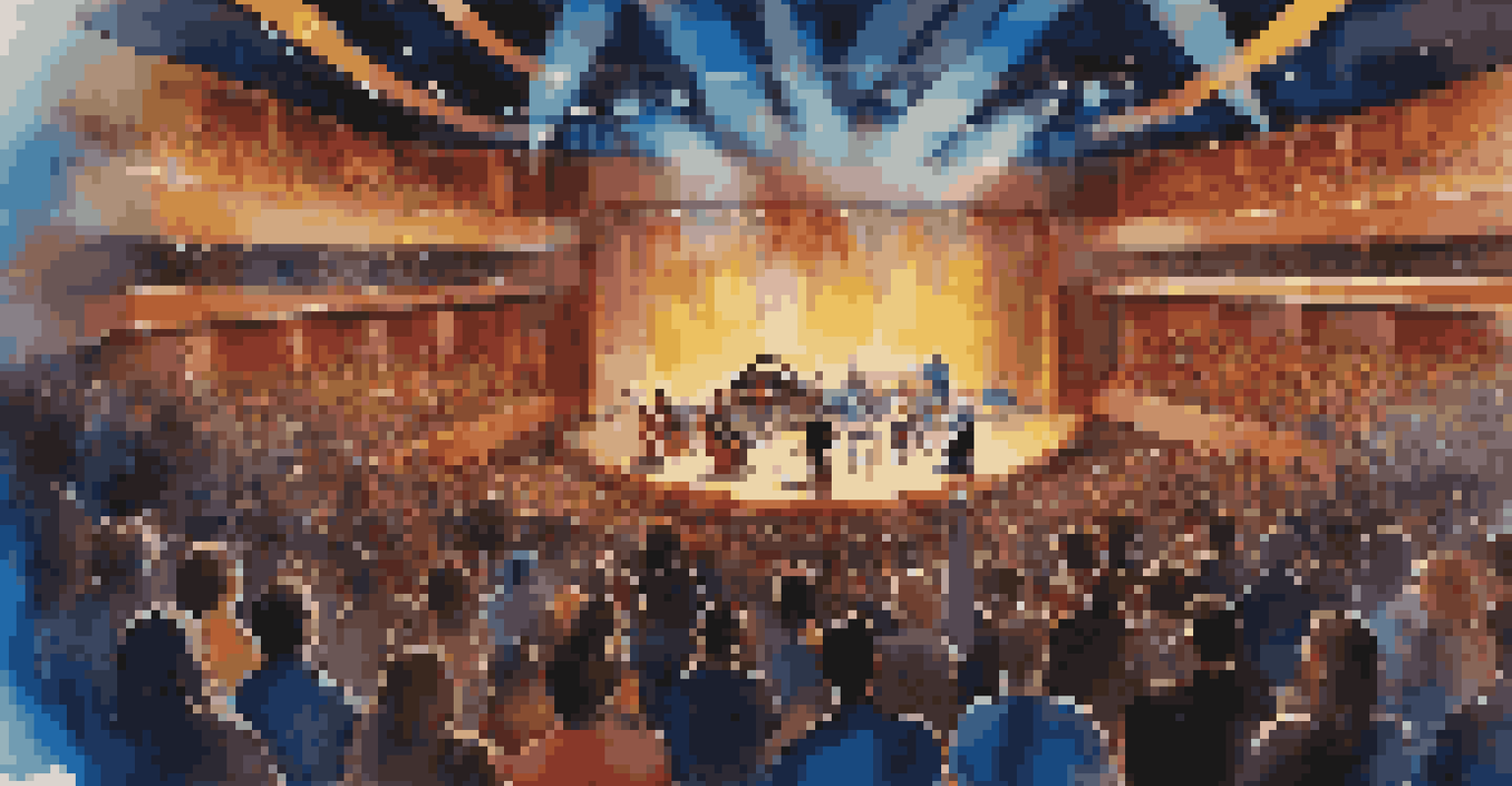Understanding the Stages of Performance Anxiety in Musicians

What is Performance Anxiety in Musicians?
Performance anxiety is a common experience for musicians, often manifesting as nervousness or fear when performing in front of an audience. It's the feeling that creeps in before the spotlight hits, making your heart race and palms sweat. This anxiety can affect anyone, from amateur performers to seasoned professionals, and it's crucial to understand its impact on performance.
Anxiety is like a rocking chair. It gives you something to do but gets you nowhere.
Imagine standing on stage, the lights glaring down, and the audience's eyes fixated on you. The pressure can be overwhelming, leading to a fear of judgment or failure. This anxiety doesn't just disappear; it can linger in the back of a musician's mind, affecting both practice sessions and live performances, creating a cycle of worry.
Understanding performance anxiety is the first step in addressing it. By acknowledging that this feeling is normal, musicians can begin to explore strategies to manage it, ensuring they can deliver their best performances despite the nerves.
The Initial Stage: Anticipation and Fear
The initial stage of performance anxiety often begins with anticipation, where excitement about an upcoming performance mixes with fear. Musicians might find themselves caught in a whirlwind of 'what if' scenarios, imagining everything that could go wrong. This stage can lead to sleepless nights and obsessive thoughts about their performance.

Take for instance a musician preparing for a concert. As the date approaches, they may start to envision the audience's reaction, amplifying their anxiety. The fear of making mistakes or forgetting notes can overshadow their excitement, creating a mental block that can hinder practice and preparation.
Understanding Performance Anxiety
Performance anxiety is a common challenge for musicians, affecting their ability to perform due to fear and self-doubt.
Recognizing this stage is essential for musicians. Acknowledging these feelings allows for proactive coping strategies, such as visualization techniques or positive affirmations, to help shift focus from fear to confidence.
The Performance Day: Heightened Anxiety
On the day of a performance, anxiety often peaks. Musicians may experience physical symptoms like increased heart rate, sweaty palms, or even nausea. These reactions are all part of the body's fight-or-flight response, which can be triggered by the pressure to perform well.
The only thing we have to fear is fear itself.
Picture a musician backstage, pacing nervously as the showtime approaches. The anticipation builds as they hear the audience chatter, which can heighten feelings of dread. This stage is critical; how a musician manages these feelings can greatly influence their performance.
It's important for musicians to have a toolbox of techniques ready for this stage. Deep breathing exercises, warming up their instrument, and focusing on the music rather than the audience can help channel that anxiety into energy for an engaging performance.
The Performance: Adrenaline and Flow
During the actual performance, many musicians experience a surge of adrenaline that can lead to a state of flow. This is when they become fully immersed in their music, often losing track of their surroundings and the audience. The initial anxiety may transform into excitement, allowing them to perform at their best.
Think of an athlete who thrives on competition; similarly, musicians can harness that adrenaline to enhance their performance. The key is to shift the focus from the fear of making mistakes to the joy of sharing their art with others.
Coping Strategies for Musicians
Employing techniques like mindfulness, visualization, and deep breathing can help musicians manage anxiety effectively.
However, not all musicians reach this state of flow. Some may still struggle with anxiety during the performance, making it essential to have strategies in place to regain focus and composure, ensuring they can still connect with their music and audience.
Post-Performance: Reflection and Evaluation
After a performance, musicians often enter a reflective stage. They may replay the performance in their minds, critiquing their playing and focusing on what went well or what could have been better. This self-assessment is a natural part of the process but can sometimes lead to increased anxiety for future performances.
Consider the musician who finishes a concert and immediately thinks about their mistakes, rather than celebrating their successes. This reflective stage can be a double-edged sword; while it helps in growth and improvement, it can also perpetuate the cycle of anxiety.
To mitigate this, it's beneficial for musicians to practice self-compassion. Acknowledging achievements, no matter how small, and using constructive feedback can help them grow without falling into a negative thought spiral.
Coping Strategies for Managing Anxiety
There are several effective coping strategies that musicians can employ to manage performance anxiety throughout its stages. Techniques such as mindfulness, visualization, and deep breathing can help ground musicians in the moment, reducing feelings of overwhelm. Regular practice of these techniques can lead to a more positive experience when performing.
For example, a musician might visualize themselves on stage, playing confidently and enjoying the performance. This mental rehearsal can create a sense of familiarity and ease during actual performances, helping to combat anxiety.
Preparation Reduces Anxiety
Thorough preparation and practice can significantly boost a musician's confidence, transforming anxiety into excitement when performing.
Additionally, seeking support from fellow musicians or a mental health professional can provide valuable tools and perspectives. Building a community can foster understanding and reduce the stigma around performance anxiety, making it easier for musicians to share their experiences and learn from one another.
The Role of Preparation in Reducing Anxiety
Preparation plays a pivotal role in reducing performance anxiety for musicians. The more prepared a musician feels, the more confident they will be when it’s time to perform. This can involve not only practicing their pieces but also familiarizing themselves with the performance environment.
Imagine a musician who walks through the venue before the show, visualizing their performance space and where they will stand. This kind of preparation can help desensitize them to the environment, making it feel less intimidating when they finally take the stage.

Moreover, creating a structured practice routine can enhance a musician's skill level, providing them with a solid foundation to rely on during performances. This sense of preparedness can transform anxiety into excitement, allowing them to focus on sharing their music.
Embracing Anxiety: A Path to Growth
Ultimately, embracing performance anxiety can be a valuable part of a musician's journey. Instead of viewing anxiety solely as a hurdle, it can be seen as a signal of passion and dedication to their craft. Recognizing that many musicians experience similar feelings can provide a sense of solidarity.
For instance, famous musicians often share stories of their own battles with performance anxiety, highlighting that it’s a universal experience. By reframing anxiety as a natural response, musicians can learn to channel it into their performances and use it to enhance their artistry.
As musicians continue to grow and evolve, learning to manage anxiety becomes an integral part of their development. By embracing this journey, they can not only improve their performances but also cultivate resilience and confidence that extend beyond the stage.